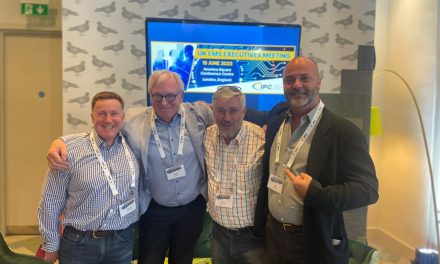Industry 5.0 Isn’t a Thing
By Francisco Almada Lobo, CEO, Critical Manufacturing
If you have been promoting your solutions or services as I5.0, then I apologize in advance, but maybe it wouldn’t be a bad idea to rethink that positioning. IMHO.

Francisco Almada Lobo
The advent of Industry 5.0 appears to have been based on the Society 5.0 model, introduced by the Japanese government in 2016, according to which various technologies, including AI, would be integrated in a more efficient way in society.
Based on these principles, the European Commission conceptualized Industry 5.0 as something which emphasizes the reintroduction of the human touch into industrial processes, creating a sustainable, resilient, and human-centric industry. This model not only aims to maintain economic progress and technological advancement but also seeks to ensure the well-being of workers, address the negative impacts of digitalization.
The problem is that by putting the 4.0 and 5.0 side by side we’re ignoring that while the first was coined to describe a real and observable shift in industrial practices, grounded in technology advancements such as IoT and AI, bringing up the possibility of new transformative business models, the second is being used as a political and societal direction, trying to steer the technological advances of Industry 4.0 towards outcomes that are more aligned with human values and ecological balance.
So, you may be wondering why is this steering I4.0 into a better society overall not positive?
The problem is that Industry 4.0 is already a fertile ground for misconceptions, jargon, vagueness, and overgeneralization, because it relates to several technologies with different stages of maturity and with very low standardization, even in terms of terminology. As such, Industry 5.0 may result in a diversion from the evolution in progress and from the gains already achieved, creating a confusion that can become quite counterproductive.
Moreover, some of the assumptions of making it a new concept, as opposed to the old one, are fundamentally wrong. I’d like to just highlight what I believe to be the two main misconceptions with Industry 5.0.
Misconception # 1 – we can have a 5th industrial revolution before having a 4th
It’s crucial to understand that the transformative power of an industrial revolution is measured not by the sophistication of its technologies or the fervor of its advocates, but by its widespread adoption and the productivity gains it delivers. By this metric, Industry 4.0 is far from being a reality. It is still finding its footing. It’s a revolution in progress, waiting to deliver on its promise.
I bring you a very clear chart to illustrate that. It’s from Deloitte’s article Driving value with smart factory technologies | Deloitte Insights, with data gathered from the US Bureau of Labor Statistics, where the productivity gains derived from the 3rd industrial revolution are quite evident, but the ones from the 4th are not at all.

Driving value with smart factory technologies | Deloitte Insights
The main argument here is the following: if the fourth industrial revolution has not yet happened, we should not talk about a fifth….
Misconception #2 – 5.0 is all about humans and 4.0 about automation
But the second is even more important. It is based on the assumption that the Industry 4.0 is focusing only on an economistic perspective based on automation and productivity, ignoring the human-centric perspective and the environmental aspects.
Sometimes, the best is to go back to the basics and understand what the original Industry 4.0 program was all about. The first report I read about the topic and one of the oldest that I could find were these “Recommendations for implementing the strategy initiative Industrie 4.0 – Final report of the Industrie 4.0 Working Group” from 2013

Recommendations for implementing the strategy initiative Industrie 4.0 – Final report of the Industrie 4.0 Working Group
But it seems the EC has studied it sufficiently, because, it clearly states that the Innovation in Business is not just about efficiency; Industry 4.0 paves the way for “new ways of creating value and novel business models,” particularly benefiting start-ups and small businesses by offering them opportunities to “develop and provide downstream services.”
Moreover, it shall allow addressing global challenges: Beyond business, Industry 4.0 is set to tackle broader issues like “resource and energy efficiency, urban production and demographic change,” leveraging continuous productivity and efficiency gains across the “entire value network.”
Finally, flexibility and balance: Industry 4.0 will also revolutionize work organization, allowing for greater flexibility and the ability to better integrate work with private life, ultimately leading to “a better work-life balance.” The smart systems of Industry 4.0 will “release workers from having to perform routine tasks,” thereby freeing them up for more creative, value-added activities. This shift is particularly crucial in light of a looming “shortage of skilled workers,” as it could enable “older workers to extend their working lives and remain productive for longer.”

From “Recommendations for implementing the strategy initiative Industrie 4.0 – Final report of the Industrie 4.0 Working Group”
So overall, this reflects the optimistic view that Industry 4.0 is not only a technological leap but also a means to improve business models, address societal challenges, and enhance the quality of work life.
Bottom-line: refocus on the Industry 4.0 promise: technology for people and society
In essence, the true power of Industry 4.0 lies in putting technology at the service of personalization and flexibility. But it’s far from being done, and all Industry 4.0 advocates and practitioners need to understand that these innovations are deeply intertwined with the social fabric. As we deploy new and advanced technologies, we navigate complex issues related to workforce transformation, ethical AI use, and digital security. These are not just technological challenges but societal ones that demand our full attention and thoughtfulness.
Industry 4.0 is not merely about machines and tech; it’s about people, cultures, and societies adapting to a seismic shift in the way we live and work.
Only by fully realizing this current phase can we lay a solid foundation for whatever industrial era comes next. The imperative of now is clear: to focus, refine, and optimize Industry 4.0, ensuring it delivers on its transformative promise for everyone, everywhere.












